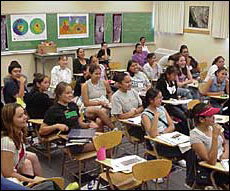



 |
|
   |

|
By the People Backgrounder: National Education Issues What is the Nature of the Education Challenge Facing the Nation? Education is also a major factor in our country's competitiveness. Many U.S. corporate executives charge that we are not successfully educating a workforce for a globalized world and have called for the overhaul of our education system. Education Issues on the Table Running through these debates is a question about the responsibility that parents, local/state government, and federal government should have. Another common thread in the discussion is the question of how we are preparing our students for work in a globalized world, and the impact this will have on our nation's economic competitiveness. School Standards and Tests for the 21st Century Supporters of this approach think schools work best when teachers and students know what is expected of them and society has a way to measure how well those expectations are being met. Schools that lag behind are given clear guidelines for improvement. Critics of this approach think it focuses too much on teaching to the test. As a result, schools may drop or de-emphasize subjects that aren't on the test, like art, music, foreign languages, and creative writing. As a result, they say, overall learning may suffer. Critics also worry that under this approach local control is sacrificed to state and national governments. Many believe that local communities, including parents and school officials, should decide on their own what to teach-- and whether and how to test-- their local student body. Others think government might offer suggestions or guidelines, but should not tell local communities how to run their schools.
Equal Educational Opportunity for All Some say the best way to deal with these problems is to give children in underperforming public schools—schools that are often in poorer districts, populated by minority students—new schooling options, including the chance to get vouchers to attend private schools or the choice to go to charter schools. Supporters call this approach "school choice," and think our school system should operate like our economic market and allow consumers to hold public schools accountable. They believe that choice, not additional funding for public schools, is the answer to our education problem. They point out that while real per pupil education spending increased by 42% on average between 1981 and 2001, test scores remained stagnant. They also believe that public schools that cannot attract and keep students do not deserve public money. Instead, they propose vouchers and magnet or charter schools, which they say will give parents more control over their children's education by providing options while forcing substandard public schools to improve. Critics of this approach say vouchers and charter schools make the overall improvement of public education more difficult by draining valuable resources from our core public school system, which they suggest is the most important institution for educating most students. They believe we should focus on targeting funding to improve our most troubled public schools by reducing teacher/student ratios, providing targeted tutoring, boosting teacher pay to increase teacher quality, and improving facilities, from basic systems to the science and computer labs needed to train tomorrow's workers. These critics also note that the poorest children do not always benefit from the current school choice options, as vouchers often do not cover the full cost of attending private schools. There are still others who think we should find a way to do both things at the same time: 1) allocate more money to underperforming schools and 2) provide educational choices for families, including vouchers and charter schools, even if this means raising taxes or finding other sources of revenue.
Discussion Questions:
Additional Reading: Online NewsHour: No Child Left Behind August 30, 2005 -- College Prep As new standardized test scores are revealed, are students prepared for college? August 24, 2005 -- School Rules Connecticut on Monday sued the U.S. government over the No Child Left Behind law, saying the Department of Education has not supplied the necessary funds to implement the programs. May 5, 2005 -- Free Tutoring John Merrow looks at how the No Child Left Behind law is affecting the growing number of free tutoring programs for students around the country. April 26, 2005 -- Breaking the Pattern Spencer Michels examines efforts to lower Hispanic dropout rates in schools around the country. April 14, 2005 -- Utah's No Child Left Behind Act Educators in Utah have devised a new plan to improve school performance, one they say overrides the Bush administration's "flawed" No Child Left Behind Act. April 7, 2005 -- Newsmaker: Margaret Spellings Secretary of Education Margaret Spellings discusses some forthcoming revisions to the education law No Child Left Behind. August 18, 2004 -- Charter Schools The American Federation of Teachers released an analysis this week of a Department of Education study, which found that fourth-grade students in public schools are more proficient in reading and math than their counterparts in privately run charter schools. Gwen Ifill speaks with Bella Rosenberg, special adviser to the president of the American Federation of Teachers, and Department of Education Undersecretary Nina Rees. July 19, 2004 -- Underfunded Schools Decreased funding has caused many public schools across the nation to struggle to stay afloat. Spencer Michels reports on the detrimental effect budget cutbacks have on schools located in lower income areas in California.
© 2005 MacNeil/Lehrer Productions. All rights reserved.
Any publication or use of this material without the express permission
of MacNeil/Lehrer Productions is strictly prohibited. |
||||||||||||||||||||||||||||||||||||||||||||||||||||||||